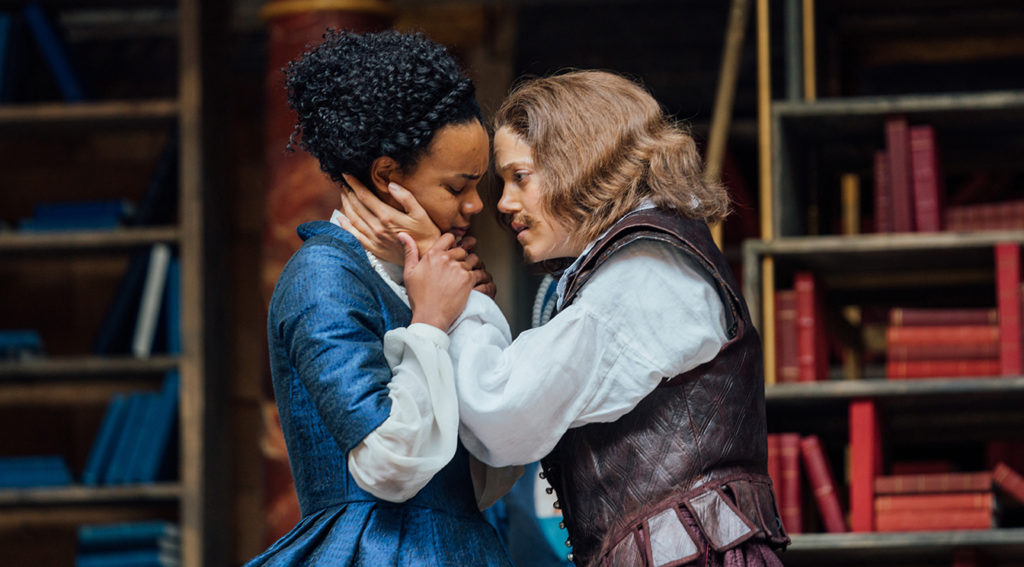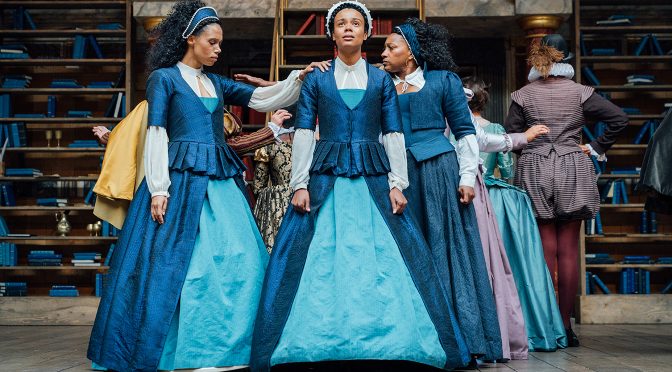Ostensibly an historical biography of poet and proto-feminist Emilia Bassano, playwright Morgan Lloyd Malcolm and her director Nicole Charles have current times very much in mind for a play that’s about sexism and racism.
The key move is to use the fact that little is known about Bassano. If the name rings a bell, it’s as the reputed ‘dark lady’ of Shakespeare’s sonnets: the casting takes this literally to examine prejudices suffered due to race as well as gender. The wish is to reclaim women and minorities in history, and the result is unashamedly political.
The language alone tells you the target is the here and now. There’s talk of positions of privilege and mansplaining and, when it comes to dancing, they “slay”. Lloyd Morgan’s many eloquent turns of phrase include a motif of “uprooted growth” for Bassano’s African origins: a heritage that means she is used as a “curiosity” at court – a double whammy of abuse.
We get not one but three Emilias, who are all impressive. Led by a magisterial Clare Perkins, there are strong performances from Vinette Robinson and Leah Harvey, who work together to take us through the character’s life.

The all-female ensemble supports with vigour in a variety of roles, most entertainingly when taking on male parts. Sophie Russell’s Lord Howard is great, with a brilliant dash of Lord Flashheart from Blackadder. And we get to meet Will Shakespeare himself – a delicious performance from Charity Wakefield – who gets a poor rap considering he’s one reason we’re all sitting on the Southbank. Appropriating some of Bassano’s lines, he’s part of the problem, saved only by being amusingly ineffectual. Emilia is specially commissioned for The Globe, a scene is set in the theatre and Charles uses the space superbly – maybe the chance to resist bardolatry was irresistible.
It seems safe to say Lloyd Malcolm hopes to stir debate. Uncomfortable parallels with Elizabethan immigration policy are leapt on and Emilia’s wish for a “voice” is a recurring theme. There are some problems: religion is mostly omitted and considering class brings a lot of trouble. Emilia comes to see her own privilege and, as is de rigueur, has to be reminded that victimhood isn’t a competition by a circle of sisterly support, Yet with the working-class women Emilia befriends, somewhat miraculously, we are in tarts-with-hearts territory too quickly.
This is an openly angry affair and that may turn some people off. Yet the sense that theatre can do something, a calling to account and an empowerment, is sincere and moving. But it does have an unfortunate consequence. The play destines itself to fail as biography: the action is too brief, taking on too many key moments (a baby daughter’s death feels especially truncated), when fewer might have been addressed in more depth. The result is little sense of Emilia as an individual. The character can’t get away from the – always admirable – arguments. You can cheer along with many of the sentiments, but is there a question that Emilia is merely being used all over again?
Until 1 September 2018
Photos by Helen Murray

